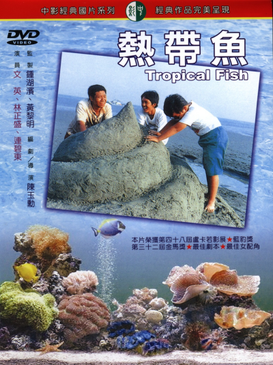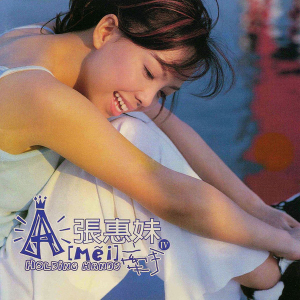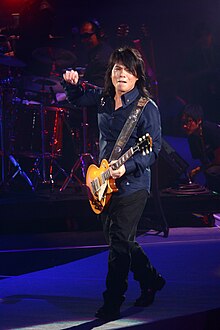
Machi is a Taiwanese hip hop group that has nine active members, with two additional members on a hiatus from group activities.

The Rock Records Co., Ltd. commonly known as Rock Records, is a record label based in Taipei, Taiwan. Founded in the 1980s as the Rock Music Publishing by Tuan Chung-tan and Tuan Chung-i, It is the largest record label in Chinese-speaking world and the second largest independent record label in Asia.

Chang Fei (Chinese: 張菲; pinyin: Zhāng Fēi; Pe̍h-ōe-jī: Tiuⁿ Húi ; born Chang Yan-ming is a Taiwanese singer and television personality.

Chen Hsin-hung ; Pha̍k-fa-sṳ: Chhîn Sìn-fên, nicknamed Ashin, born 6 December 1975, is a Taiwanese singer-songwriter, author, and the vocalist of the Taiwanese band Mayday. Ashin majored in art in college, where he also began his musical career.

Mayday is a Taiwanese rock band formed in 1997. Consisting of five members, Monster, Ashin (vocal), Stone, Masa (bass) and Ming (drums), they released their first album in 1999.

Cheer Chen Chi-chen is a Taiwanese singer-songwriter. Her most recent album, Sofa Sea, was released in 2018.

Freya Lim, also known as Freya Lin, is a Malaysian Mandopop singer and radio deejay based in Taiwan. She is a Taiwanese PR. Her father is a Chinese Malaysian and her mother is a Taiwanese.

Harlem Yu is a Taiwanese singer-songwriter, television host and businessman. He is particularly well-known for singing the theme song, Qing Fei De Yi, for the 2001 television drama, Meteor Garden. He made a cameo in both that version and the 2018 remake, Meteor Garden performing Qing Fei De Yi (情非得已). He has been hosting television shows in Taiwan since 1994 and in China since 2011, and served as a coach for three seasons of The Voice of China and three seasons of Sing! China.

Chang Chen-yue, also known as A-Yue and by his Amis name Ayal Komod, is an aboriginal Taiwanese rock and Hip-Hop musician, songwriter, singer and guitarist, and the frontman of his band, Free Night, also known as Free9. He is most widely known for his 1998 hit song "Ai Wo Bie Zou". His 2013 album I am Ayal Komod was awarded the Best Album Award during the 25th Golden Melody Awards.

Sodagreen is a Taiwanese indie band formed in 2001. Its members have been unchanged since 2003. Sodagreen emerged in the Taiwanese indie music scene after receiving the Grand Jury Award in the Hohaiyan Gongliau Rock Festival in 2004, after which it signed a contract with Willlin Music. The band is the first indie band to hold a concert in the Taipei Arena.

Rene Liu Ruo-ying is a Taiwanese singer-songwriter, actress, director and writer. In the Sinophone world, Liu is widely known by her affectionate nickname "Milk Tea". Her music often focuses on love stories and has built an image around herself as a single woman. She is known for her mature, professional, urbane, single woman persona.

Shin is a Taiwanese singer, songwriter and actor. He is known as the former lead singer of the rock band Shin and a Golden Melody Awards nominee for Best Mandarin Male Singer.

Tropical Fish is a 1995 Taiwanese comedy-drama film written and directed by Chen Yu-hsun. It is an example of New Taiwanese Cinema.

Lin Wanfang, professionally known as Wanfang, is a Taiwanese singer, actress and radio DJ. She is renowned for her sonorous, gentle soft voice and probably best known for being the original theme singer of the film C'est la vie, mon chéri (新不了情).

Dust of Angels is a 1992 Taiwanese crime film directed by Hsu Hsiao-ming, executive produced by Taiwanese filmmaker Hou Hsiao-hsien. It was entered into Directors' Fortnight at the 1992 Cannes Film Festival. "An lah" (安啦) is a Taiwanese Hokkien colloquialism; the title in full roughly translates to "take it easy, lad" or "cool it, kid."

Nylon Chen is a Taiwanese singer and actor.

Eric Chou is a Taiwanese singer, songwriter and actor. He has been dubbed by the Taiwanese media as "king of the lovelorn people". Chou's self-composed smash hit "The Distance of Love", the ending theme of the 2014 Taiwanese drama The Way We Were, where he also made a cameo, reached 100 million views on YouTube, making Chou the youngest Mandopop artist to reach the feat at that time.

Ugly Beauty World Tour is the fifth concert tour by Taiwanese singer Jolin Tsai. It started on December 30, 2019, in Taipei, Taiwan at Taipei Arena.

Holding Hands is the fourth studio album by Taiwanese singer A-Mei. It was released on October 12, 1998, by Forward Music. The album was produced by Forward Music's then-music director Chen Chih-yuan and was A-Mei's first original studio album since the death of her mentor Chang Yu-sheng eleven months prior. On the record, A-Mei sang Chang's posthumous works "Are You Ready" and "After Knowing," and for the first time, she collaborated with David Tao on the songs "Don't Lie To Me" and "High High High," which allowed A-Mei to try out different kinds of music creations. The music on Holding Hands fuses pop music with other genres including R&B, dance pop, adult contemporary and rock music.



















